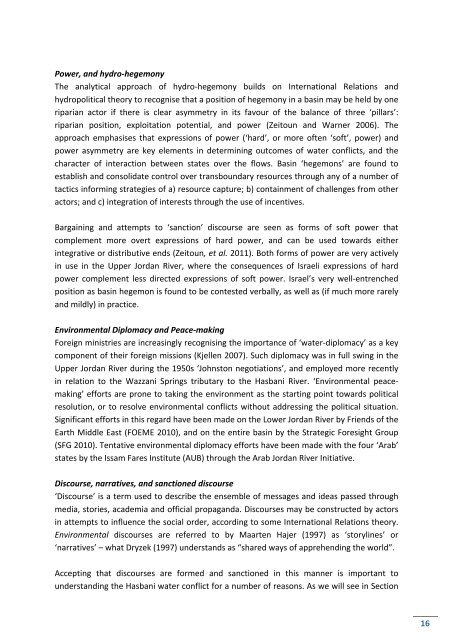Hydro-‐political Baseline of the Upper Jordan River - Ibrahim Abd El Al
Hydro-‐political Baseline of the Upper Jordan River - Ibrahim Abd El Al
Hydro-‐political Baseline of the Upper Jordan River - Ibrahim Abd El Al
You also want an ePaper? Increase the reach of your titles
YUMPU automatically turns print PDFs into web optimized ePapers that Google loves.
Power, and hydro-‐hegemony<br />
The analytical approach <strong>of</strong> hydro-‐hegemony builds on International Relations and<br />
hydropolitical <strong>the</strong>ory to recognise that a position <strong>of</strong> hegemony in a basin may be held by one<br />
riparian actor if <strong>the</strong>re is clear asymmetry in its favour <strong>of</strong> <strong>the</strong> balance <strong>of</strong> three ‘pillars’:<br />
riparian position, exploitation potential, and power (Zeitoun and Warner 2006). The<br />
approach emphasises that expressions <strong>of</strong> power (‘hard’, or more <strong>of</strong>ten ‘s<strong>of</strong>t’, power) and<br />
power asymmetry are key elements in determining outcomes <strong>of</strong> water conflicts, and <strong>the</strong><br />
character <strong>of</strong> interaction between states over <strong>the</strong> flows. Basin ‘hegemons’ are found to<br />
establish and consolidate control over transboundary resources through any <strong>of</strong> a number <strong>of</strong><br />
tactics informing strategies <strong>of</strong> a) resource capture; b) containment <strong>of</strong> challenges from o<strong>the</strong>r<br />
actors; and c) integration <strong>of</strong> interests through <strong>the</strong> use <strong>of</strong> incentives.<br />
Bargaining and attempts to ‘sanction’ discourse are seen as forms <strong>of</strong> s<strong>of</strong>t power that<br />
complement more overt expressions <strong>of</strong> hard power, and can be used towards ei<strong>the</strong>r<br />
integrative or distributive ends (Zeitoun, et al. 2011). Both forms <strong>of</strong> power are very actively<br />
in use in <strong>the</strong> <strong>Upper</strong> <strong>Jordan</strong> <strong>River</strong>, where <strong>the</strong> consequences <strong>of</strong> Israeli expressions <strong>of</strong> hard<br />
power complement less directed expressions <strong>of</strong> s<strong>of</strong>t power. Israel’s very well-‐entrenched<br />
position as basin hegemon is found to be contested verbally, as well as (if much more rarely<br />
and mildly) in practice.<br />
Environmental Diplomacy and Peace-‐making<br />
Foreign ministries are increasingly recognising <strong>the</strong> importance <strong>of</strong> ‘water-‐diplomacy’ as a key<br />
component <strong>of</strong> <strong>the</strong>ir foreign missions (Kjellen 2007). Such diplomacy was in full swing in <strong>the</strong><br />
<strong>Upper</strong> <strong>Jordan</strong> <strong>River</strong> during <strong>the</strong> 1950s ‘Johnston negotiations’, and employed more recently<br />
in relation to <strong>the</strong> Wazzani Springs tributary to <strong>the</strong> Hasbani <strong>River</strong>. ‘Environmental peace-‐<br />
making’ efforts are prone to taking <strong>the</strong> environment as <strong>the</strong> starting point towards political<br />
resolution, or to resolve environmental conflicts without addressing <strong>the</strong> political situation.<br />
Significant efforts in this regard have been made on <strong>the</strong> Lower <strong>Jordan</strong> <strong>River</strong> by Friends <strong>of</strong> <strong>the</strong><br />
Earth Middle East (FOEME 2010), and on <strong>the</strong> entire basin by <strong>the</strong> Strategic Foresight Group<br />
(SFG 2010). Tentative environmental diplomacy efforts have been made with <strong>the</strong> four ‘Arab’<br />
states by <strong>the</strong> Issam Fares Institute (AUB) through <strong>the</strong> Arab <strong>Jordan</strong> <strong>River</strong> Initiative.<br />
Discourse, narratives, and sanctioned discourse<br />
‘Discourse’ is a term used to describe <strong>the</strong> ensemble <strong>of</strong> messages and ideas passed through<br />
media, stories, academia and <strong>of</strong>ficial propaganda. Discourses may be constructed by actors<br />
in attempts to influence <strong>the</strong> social order, according to some International Relations <strong>the</strong>ory.<br />
Environmental discourses are referred to by Maarten Hajer (1997) as ‘storylines’ or<br />
‘narratives’ – what Dryzek (1997) understands as “shared ways <strong>of</strong> apprehending <strong>the</strong> world”.<br />
Accepting that discourses are formed and sanctioned in this manner is important to<br />
understanding <strong>the</strong> Hasbani water conflict for a number <strong>of</strong> reasons. As we will see in Section<br />
16


